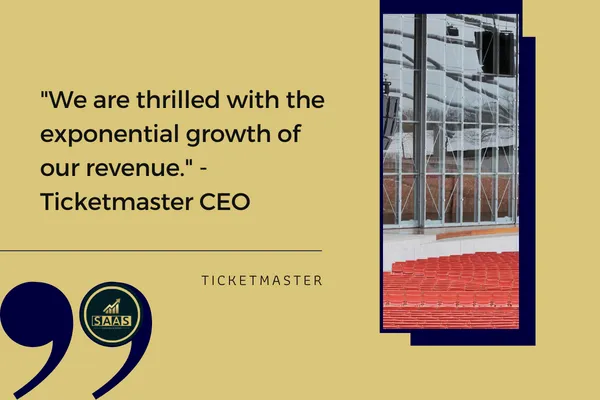Exciting Insights and Tips on Digital Marketing, Sales, Hustle Life, Customer Service, and Upcoming AI

Ticketmaster Achieves Unprecedented Revenue Growth Amidst Customer Service Challenges

Ticketmaster's Record-Breaking Revenue in 2023 Despite Customer Service Controversies
In 2023, Ticketmaster, the world's largest ticket vendor, reported record-breaking revenue despite facing various customer service controversies. This article will delve into the factors contributing to this growth and highlight the increase in ticket revenue.
Ticketmaster's dominance in the market is undeniable. Through its merger with Live Nation, the company has solidified its position as the leading ticket vendor globally, processing millions of tickets each year. This market dominance has undoubtedly played a significant role in its ability to generate substantial revenue.
One of the key factors contributing to Ticketmaster's revenue growth is the increase in ticket prices. As demand for tickets to major events continues to rise, Ticketmaster has capitalized on this trend by raising prices. While this may be seen as a disadvantage for consumers, it has undoubtedly contributed to the company's financial success.
Furthermore, the demand for tickets to major events has been a driving force behind Ticketmaster's record-breaking revenue. Whether it's a highly anticipated concert, a major sporting event, or a popular theater production, Ticketmaster has been able to meet the demand and generate significant sales.
However, it is important to acknowledge that Ticketmaster's success has not come without its fair share of controversies. The company has faced backlash and criticism related to customer service issues during musical tours by artists like Taylor Swift, Beyoncé, and Drake.
Despite these controversies, Ticketmaster has managed to maintain its financial success. This raises questions about the company's priorities and whether it truly values customer service. While some may argue that its market dominance allows it to prioritize profit over customer satisfaction, it serves as a reminder to other businesses that prioritizing the customer experience can be a powerful differentiator.
In the following sections, we will delve deeper into Ticketmaster's revenue and market dominance, as well as the specific customer service controversies it has faced. By examining these crises, we can draw valuable insights and takeaways for businesses looking to provide exceptional customer service in their respective industries.
Ticketmaster's revenue and market dominance are explored in this section.
The company's merger with Live Nation has made it the leading ticket vendor globally, processing millions of tickets each year. It experienced a significant increase in revenue in the first half of 2023 and predicted a highly profitable year. However, it also faced backlash and controversies related to musical tours by artists like Taylor Swift, Beyoncé, and Drake.
Ticketmaster's dominance in the ticketing industry cannot be overstated. With its merger with Live Nation, the company has solidified its position as the leading ticket vendor worldwide. Processing millions of tickets each year, Ticketmaster has established a stronghold on the market, allowing it to generate substantial revenue.
In the first half of 2023, Ticketmaster experienced a remarkable increase in revenue, surpassing previous records. This surge in revenue can be attributed to several factors. Firstly, ticket prices have been on the rise, contributing to higher overall revenue. As demand for tickets to major events continues to grow, Ticketmaster has been able to capitalize on this trend by charging premium prices.
Additionally, the company's ability to secure exclusive deals with major artists and events has played a significant role in its revenue growth. By being the go-to ticket vendor for highly anticipated concerts and tours, Ticketmaster has been able to attract a large customer base and generate substantial sales.
However, despite its financial success, Ticketmaster has not been immune to controversies and customer service issues. Several high-profile incidents involving artists like Taylor Swift, Beyoncé, and Drake have tarnished the company's reputation.
The Taylor Swift ticket scandal, for instance, saw Ticketmaster's system crashing due to overwhelming demand and the presence of bots purchasing tickets. This led to inflated prices and widespread criticism from fans. The company even faced a lawsuit from disgruntled fans who felt cheated by the system's failure.
Similarly, Beyoncé's tour experienced technical issues during ticket sales, leaving many users frustrated. In an attempt to combat bots and resellers, Ticketmaster implemented staggered selling dates and a verified fan process. However, these measures did not entirely prevent technical glitches, resulting in a negative customer experience.
Drake's tour also brought its fair share of customer service problems for Ticketmaster. The company advertised lower ticket prices that turned out to be inaccurate, causing frustration among fans. A lawsuit was filed, alleging that Ticketmaster intentionally withheld information to boost ticket sales. This incident shed light on the lack of customer centricity in the ticket industry and the need for better regulation.
Despite these controversies, Ticketmaster remains a dominant force in the ticketing industry. Its market position and revenue growth demonstrate its ability to weather storms and maintain its stronghold. However, these incidents serve as a reminder that even industry giants like Ticketmaster must prioritize customer service and address the concerns of their customers.
In the next section, we will delve deeper into the specific customer service crises faced by Ticketmaster, starting with the Taylor Swift ticket scandal.
In the next section, we will explore another customer service crisis involving Drake's tour, which further exposes the lack of customer centricity in the ticket industry and the minimal regulation in place.
Unlock Success with High-Level Snapshot: Your Ultimate SaaS Solution for Small Business Growth!
The first customer service crisis discussed is the Taylor Swift ticket scandal, where Ticketmaster's system crashed due to high demand and bots purchasing tickets, leading to inflated prices. The company faced widespread criticism and a lawsuit from fans.
In 2023, Taylor Swift announced her highly anticipated world tour, causing a frenzy among her fans. As expected, tickets sold out within minutes, but what followed was a complete disaster for Ticketmaster. The surge in demand overwhelmed their system, causing it to crash and leaving countless fans frustrated and empty-handed.
To make matters worse, bots took advantage of the chaos and purchased a significant number of tickets, only to resell them at exorbitant prices on secondary ticketing platforms. This led to inflated prices that were far beyond what fans were willing to pay. Understandably, fans were outraged and accused Ticketmaster of failing to protect them from scalpers and resellers.
The backlash was swift and severe. Fans took to social media to express their disappointment and anger, while others filed a lawsuit against Ticketmaster, claiming that the company had violated consumer protection laws. The incident shed light on the vulnerabilities of Ticketmaster's ticketing system and raised questions about the company's ability to handle high-demand events.
The second crisis involves Beyoncé's tour, where users experienced technical issues during ticket sales. Ticketmaster's use of staggered selling dates and a verified fan process aimed to prevent bots and resellers.
When Beyoncé announced her highly anticipated tour, fans eagerly awaited the opportunity to secure tickets. However, Ticketmaster's ticketing system once again failed to meet the demand. Users encountered technical issues, such as slow loading times and error messages, which prevented them from completing their purchases.
To combat the issue of bots and resellers, Ticketmaster implemented a staggered selling process and a verified fan program. The staggered selling dates were intended to distribute the demand over multiple days, reducing the strain on the system. The verified fan program required fans to register in advance, with priority given to those who had previously attended Beyoncé's concerts or engaged with her music. While these measures were aimed at preventing scalpers and ensuring genuine fans had access to tickets, they ultimately fell short in delivering a smooth ticket-buying experience.
The incidents surrounding Taylor Swift and Beyoncé's tours highlighted the challenges Ticketmaster faces in managing high-demand events. Despite their efforts to prevent bots and resellers, their ticketing system proved to be vulnerable, leaving fans frustrated and disillusioned.
The third customer service crisis involves Drake's tour, where Ticketmaster advertised lower ticket prices that were not accurate.
Fans were frustrated by the discrepancy, and a lawsuit claimed that Ticketmaster deliberately withheld information to boost ticket sales. This crisis highlights the lack of customer centricity in the ticket industry and the minimal regulation in place.
The Drake ticket controversy further exemplifies the customer service challenges faced by Ticketmaster. In this instance, fans were enticed by the promise of lower ticket prices, only to discover that the advertised prices were not accurate. This discrepancy left fans feeling deceived and frustrated, as they had expected to pay less for their tickets.
A lawsuit was filed against Ticketmaster, alleging that the company intentionally withheld information about the true ticket prices in order to boost sales. This accusation raises concerns about the lack of transparency and customer centricity within the ticket industry. It suggests that Ticketmaster's primary focus may be on maximizing profits rather than prioritizing the needs and satisfaction of its customers.
This crisis also sheds light on the minimal regulation in place within the ticket industry. With limited oversight, ticket vendors like Ticketmaster have the freedom to engage in practices that may not align with customer expectations. The lack of clear guidelines and enforcement allows for potential exploitation of customers, as seen in the case of the misleading ticket prices.
The Drake ticket controversy serves as a reminder of the importance of customer centricity and the need for increased regulation in the ticket industry. Customers should be able to trust that the prices advertised by ticket vendors are accurate and transparent. Additionally, regulations should be in place to ensure that companies prioritize the satisfaction and well-being of their customers.
While Ticketmaster's market dominance may contribute to its ability to operate with minimal regulation, it is crucial for other businesses in the customer service industry to take note. Providing a great customer experience should be a top priority for any business, as it can serve as a significant differentiator in a competitive market. By adopting a customer-first approach, responding to feedback, being proactive, and investing in customer service technology, businesses can build trust and loyalty among their customer base.
In conclusion, the Drake ticket controversy highlights the lack of customer centricity in the ticket industry and the minimal regulation in place. It serves as a reminder of the importance of transparency, accurate pricing, and prioritizing the needs of customers. While Ticketmaster may not prioritize customer service due to its market dominance, other businesses should recognize the value of providing a great customer experience as a means to stand out and succeed in the market.
Unlock Your Agency's Potential with SCA's Expert Onboarding & Support!
Customer Service Takeaways from Ticketmaster's Crises
The customer service controversies faced by Ticketmaster in relation to the Taylor Swift, Beyoncé, and Drake tours offer valuable lessons for businesses in the ticketing industry and beyond. These crises highlight the significance of prioritizing customer service and adopting a customer-first approach. Here are some key takeaways:
1. Transparency is crucial: One of the main issues that arose from these controversies was the lack of transparency regarding ticket availability and pricing. Customers felt deceived and frustrated when they discovered inflated prices or inaccurate information. To avoid such situations, businesses should strive to be transparent about product availability, pricing, and any potential limitations. Providing clear and accurate information upfront can help build trust and prevent customer dissatisfaction.
2. Respond to feedback: Ticketmaster faced widespread criticism and lawsuits from disappointed fans. However, their response to these crises was crucial in mitigating the damage. Businesses should actively listen to customer feedback, whether it is positive or negative, and take appropriate action. Responding promptly and addressing customer concerns can help rebuild trust and loyalty.
3. Be proactive: Rather than waiting for problems to arise, businesses should take a proactive approach to customer service. Ticketmaster's use of staggered selling dates and a verified fan process for Beyoncé's tour was an attempt to prevent bots and resellers. By anticipating potential issues and implementing preventive measures, businesses can minimize customer frustrations and ensure a smoother ticket purchasing experience.
4. Invest in customer service technology: Ticketmaster's customer service crises highlighted the need for robust technology solutions to handle high demand and prevent system crashes. Investing in customer service technology, such as advanced ticketing systems and anti-bot measures, can help businesses provide a seamless and efficient customer experience. By leveraging technology, businesses can better manage ticket sales, prevent fraud, and enhance customer satisfaction.
In conclusion, while Ticketmaster's market dominance may have allowed them to prioritize revenue over customer service, other businesses should take note of the importance of providing a great customer experience. Transparency, responsiveness to feedback, proactive measures, and investment in customer service technology are key factors in ensuring customer satisfaction and loyalty. By adopting a customer-first approach, businesses can differentiate themselves in the market and build long-term success.

© 2025 SaaS Coaching Academy | All Rights Reserved | All Sales Are Final No Refunds | Privacy Policy | Terms of Service | Contact Us
info@leadstoroi.com
541-270-3477

